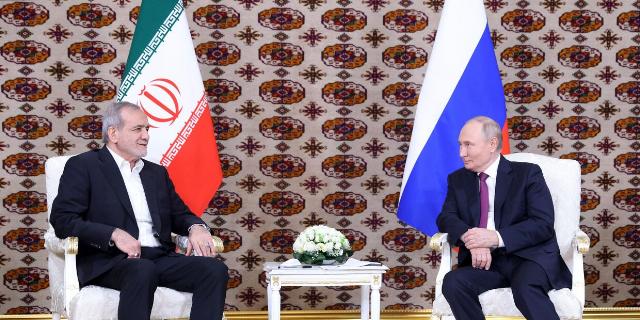Aydınlık: Russia and Iran have the resources to get rid of Western pressure
The strategic partnership agreement between Moscow and Tehran is an important step against sanctions, Aydınlık writes. Iran has the resources that can save Russia from pressure from the West. That, in turn, can meet Iran's important needs.
The strategic partnership agreement signed between Russia and Iran is regarded by experts as historic. The document is seen as an important step against the sanctions imposed on both countries and is considered one of the foundations of a multipolar world.
On Friday, January 17, Russian President Vladimir Putin and his Iranian counterpart Masoud Pezeshkian signed a strategic partnership agreement. The document covers several important areas of cooperation and is intended to help both countries in resisting external pressure. The Russian leader said that the agreement would create a solid foundation for further cooperation with the fraternal and friendly people.
Special importance is attached to peaceful nuclear energy. Iran will soon face serious challenges in developing this area. In addition, Moscow and Tehran have outlined the main outlines of specific plans for the development of the North–South trade route. Although some sources reported that the agreement would not affect the security sector, the document provides for cooperation in this area.
"Order without hegemony"
Murad Sadigzade, an expert on the Middle East, said in an interview with RT that the agreement sends a clear signal that the two countries are determined to further strengthen bilateral relations and overcome external challenges in pursuit of a just international world order. According to the expert, although the document is not directed against any country and mainly focuses on trade, economic, and humanitarian ties between the two partners, it is nevertheless partly a result of Western pressure to which both countries are subjected. Sadigzade noted that in the face of this pressure, Russia and Iran have reached a consensus on the need to reform the world order in order to create a fair international system free from destructive Western hegemony.
The Iranian expert also warned that "the ultimate goal of any American administration is regime change in Iran." Sadigzade added that the administration of newly elected President Donald Trump may try to use the Russian-Iranian agreement against Tehran.
The most important component is the geotransite position
Abolfazl Zohravand, a member of the parliamentary committee on National Security and Foreign Policy, in turn, stressed that Iran has resources that can save Russia from pressure from the West. The Iranian parliamentarian said: "Iran has needs that Russia can meet. At the same time, Iran's position will help Russia get rid of Western pressure. Therefore, the path started by the two countries in bilateral cooperation will benefit both countries. Iran is a self-sufficient country, and the resources of the two states will allow them to occupy an advantageous position."
Zohrawand noted that cooperation between Tehran and Moscow can also be effective in neutralizing sanctions. "Combining the capabilities of the two countries can move them towards neutralizing sanctions. The most important component of trade relations with Russia is its geo-transit position. This situation can make it possible to offset existing restrictions and is crucial, taking into account NATO's installations in the Baltic States and Ukraine," the expert explained.
The main points of the agreement
The agreement signed by Putin and Peseshkian covers several areas, such as education, defense, trade, and sanctions. Below are the main points.
– Mutual guarantees of non-aggression
One of the cornerstones of the agreement is the commitment to mutual defense. So, if one of the parties is subjected to aggression, the other will in no way help the aggressor.
– Military cooperation
The two countries pledged to expand cooperation in the field of defense: joint military exercises and the development of military technologies.
– Countering sanctions
Russia and Iran are subject to harsh sanctions from Western countries, and this is a problem that the agreement directly regulates. The main points: the parties undertake not to join the sanctions imposed by third countries against them, guarantee not to apply unilateral coercive measures.
– Interconnected financial infrastructure
The agreement also includes plans to create a payment system independent of third countries. The aim of this initiative is to eliminate dependence on US-controlled financial networks such as SWIFT, and to facilitate more seamless trade and investment between Russia and Iran.
– Gun control
Moscow and Tehran have agreed to cooperate in the field of global security, including initiatives on arms control and disarmament, and coordination of efforts to ensure compliance with international security standards.
– Energy and infrastructure
The document says that the two countries will continue to expand cooperation in the oil and gas sector and improve energy security through the efficient use of fuel and energy resources. This also includes joint initiatives for the exploration and development of oil and gas fields in Russia and Iran, as well as the peaceful use of nuclear energy, including the construction of nuclear power facilities.

